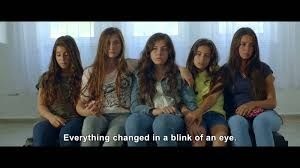
Deniz Gamze Ergüven joins Susanne Bier, Agnieszka Holland, Cristina Comencini, Marleen Gorris, Mira Nair, Coline Serreau, Maria Luisa Bemberg and Lina Wertmüller as women directors whose films have been nominated for the Oscar for Best Foreign Language film. It is a depressingly short list – nine women in 58 years. Of these, only Bier (on second nomination) and Gorris have won. Ergüven, nominated for her feature debut, Mustang, stands little chance this year against the awards magnet that is Son of Saul.
But wait... nominated for an Oscar for a debut film. That is quite an achievement. Mustang is quite a movie. It has been described as having a fairy tale atmosphere, taking place during one endless summer holiday in which five girls in a family threaten to be married off as a way of controlling their ‘wayward’ behaviour. What sort of father would do this to his daughters? Actually, it is the girls’ uncle, Erol (Ayberk Pekcan), who after the girls play in the sea with some boys – it is very innocent, trust me – decides to reinforce the door and put them under virtual house arrest to be paraded in front of various families as ‘one of a kind’.
Turkish-born Ergüven lives in France and developed the script with fellow director Alice Winocour. But Mustang wasn’t intended to be her debut. It was a script too close to home, tucked away in a drawer, whilst she developed a script about the L.A. riots. When that project didn’t get made, Ergüven returned reluctantly to the idea. Having written the script, she was reluctant to change elements to reduce the budget.
Not that Mustang is a huge spectacle. But the filmmaker had to find a house in which to shoot and a location by the Black Sea sufficiently far from Istanbul. She didn’t want to compromise on the number of sisters, or indeed on their fates. There is however a football match in which two male teams play in front of a crowd consisting entirely of women – they know how to behave. The youngest sister, Lale (Güneş Şensoy) and contrives to sneak out of the house with her four sisters, Sonay (Ilayda Akdogan), Selma (Tugba Sunguroglu), Ece (Elit Iscan) and Nur (Doga Zeynep Doguslu). The set piece leads to a rare moment of comedy as the women left in the village contrive to ensure that no man sees the five girls at the game as the match is broadcast on TV.
The opening is visceral and arresting. In the aftermath of the beach game, the girls’ grandmother takes them to task for being brazen. One by one they are taken into a room and beaten whilst the four other sisters hammer on the door. One sister smashes a chair on the grounds that it must be impure – ‘it touched my behind’. The girls function as one, a pack, a coven. Our sympathies are entirely with them, though we perceive them mainly through Lale. Ergüven has described the sisters as ‘one character with five heads’; the film bears this out.
The girls are forced to wear brown dresses that look ‘like shit’ and go to ‘wife school’, which involves preparing food and serving (milk-less) tea. One of the sisters has a boyfriend and gets married to him; another is married to a stranger. Uncle Erol fires a pistol in the air in celebration. In this film, a pistol fired in Act One is used in Act Two. The girls are encouraged to play hard-to-get on their wedding day, explaining the initial tolerance expressed during the film’s tense finale.
As each sister is paired off, we sense Lale’s impending doom. She is the youngest, not even pubescent. When she borrows her sister’s clothes she is chased around the room – it’s that sort of film, a sea of movement. We fear for her and like her because she experiences pleasure, for example at the football stadium, in a pure exultant way. She wants to learn, befriending a delivery man from whom she seeks advice about driving in large adult red shoes.
The film isn’t about characters so much as restless energy. The girls are told off for stealing apples – a gun is pointed at them. During one scene whilst the girls are inside, Uncle Erol is seen scrubbing the names of two of them – and the huge red hearts drawn beside them - off the road.
The film is undoubtedly a statement against arranged marriage – or child marriage, come to that – but it isn’t polemical. There’s not much dialogue for a start and it has too much activity. Scenes are about doing things rather than long conversations. There is the expectation that the girls have lost their virginity – the eldest are taken to the doctor and examined one by one. Their chastity is intact. After a wedding, the sheets are examined for signs of blood. But the hymen of one of the sisters hasn’t broken even after sex. This is perhaps one of the most fantastical elements in the film, but principally a sign of the girls’ resistance to their fate.
Marriage tears the sisters apart; only one act brings them back together. As the film builds to its climax, we understand what Lale is fighting against and why she is driven to attempting to escape.
Turkey is perceived as a deeply conservative society but the film has its domestic admirers, especially from educated audiences. Erdügen has the ‘luxury’ (if one can call it that) of self-imposed exile, not having to live in a country that might be critical of its self-portrait, though as she puts it, Mustang has nothing on the blistering stereotypes perpetuated by Midnight Express (thank you, Alan Parker and Oliver Stone). Mustang certainly deserves the acclaim it has received from French audiences and critics - five stars from Positif and 20 Minutes, 443,000 admissions in 13 weeks of release. It deserves to have a similar impact in the UK, though may be more divisive. We get plenty of Turkish films at my local North London multiplex, but they tend to be the domestic crowd pleasers.
Reviewed at Curzon Soho, Tuesday 16 February 2016, 18:30, followed by a question and answer session with Erdügen - with thanks to Curzon Film World




